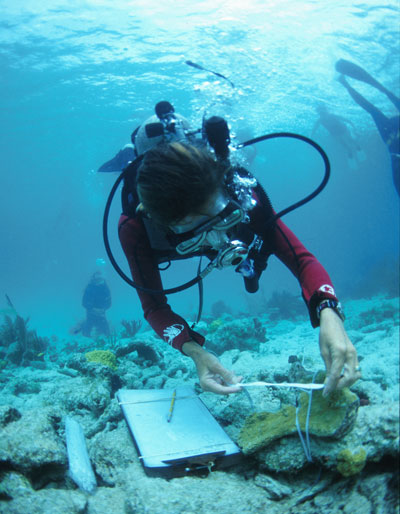- Home
- About S&T
- Taxa/Organisms
- Ecosystems
- Issues
- Methods & Tools
- Reports & Publications
- Location
- Search
Publisher: USGS (Coastal and Marine Geology Program, Eastern Region) | Format: URL
coastal.er.usgs.gov — This research was conducted in the nearshore waters of Virgin Islands National Park, St. John, US Virgin Islands. Storm-produced fragments of the three fastest growing species of Caribbean coral (elkhorn, staghorn and finger corals) were collected from habitats inhospitable to survival and transplanted to other reefs (Trunk and Whistling Cay). More...

Publisher: USGS (Coastal and Marine Geology Program, Eastern Region) | Format: URL
coastal.er.usgs.gov — Coral microbial ecology is the study of the relationship of coral-associated microorganisms to each other, the coral host, and to their environment. Just as we humans have beneficial bacteria living on our skin and in our intestines, corals also have co-habitating non-pathogenic (not disease-causing) microbes. These microbes include bacteria, More...

Publisher: USGS | Science Center: Florida Integrated Science Center (FISC, Gainesville) | Format: URL
fisc.er.usgs.gov — Visual surveys of underwater reef fish overlook the hidden, cryptic fish that comprise most of the diversity and numerical abundance of coral reef habitats. Research by Smith-Vaniz, Jelks, and Rocha shows how rotenone revealed cryptic fish in a survey of fish August-September 2001 at Buck Island Reef National Monument, St. Croix, U.S. Virgin More...

Publisher: USGS (Genetics and Genomics) | Format: URL
biology.usgs.gov — This website lists samples of genetics and genomics research from the USGS Biological Resources Discipline related to the conservation genetics of corals. These resources include Genetic Tools to Understand Complex Coral Family Tree, Deep-Sea Coral Community Genetics, Connectivity Among Reefs Formed by the Deep-Sea Coral Lophelia pertusa, and the More...

Publisher: USGS | Science Center: Florida Integrated Science Center (FISC, Gainesville) | Format: URL
fl.biology.usgs.gov — Coral Reefs in the Caribbean and western Atlantic are deteriorating in response to hurricanes, coral diseases, anchor damage, sedimentation, and other stresses. USGS biologists at the Caribbean Field Station are documenting the current status of coral reefs and the effects of some of these stresses. The primary objective of this issue overview is More...

Publisher: USGS | Science Center: Florida Integrated Science Center (FISC, Gainesville) | Format: URL
fl.biology.usgs.gov — Coral reefs in the Caribbean and western Atlantic are deteriorating in response to hurricanes, coral diseases, anchor damage, sedimentation, and other stresses. USGS biologists at the Caribbean Field Station are documenting the current status of coral reefs and the effects of some of these stresses within Virgin Islands National Park (St. John), More...

Publisher: NBII | Format: URL
www.nbii.gov — Natural resource managers face complex decisions that require a clear understanding of the status of wildlife populations and their habitats. Monitoring is key to making effective management decisions and evaluating the outcomes of those decisions. The goal of NRMP is to improve the accessibility of monitoring efforts to resource managers to aid More...

Publisher: USGS | Science Center: Fort Collins Science Center (FORT, Ft. Collins) | Format: URL
www.fort.usgs.gov — Natural Resource Monitoring Partnership (NRMP) is a collaborative effort by the natural resource management community to improve monitoring efforts in order to support effective evaluation and decision-making by sharing information on monitoring projects and protocols. The Natural Resource Monitoring Partnership was built for easy access to More...
